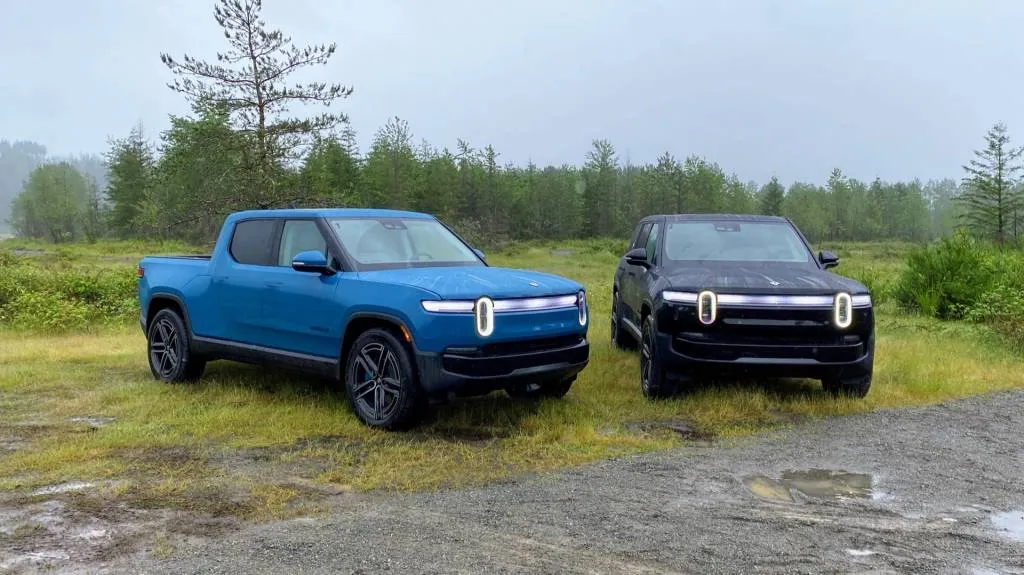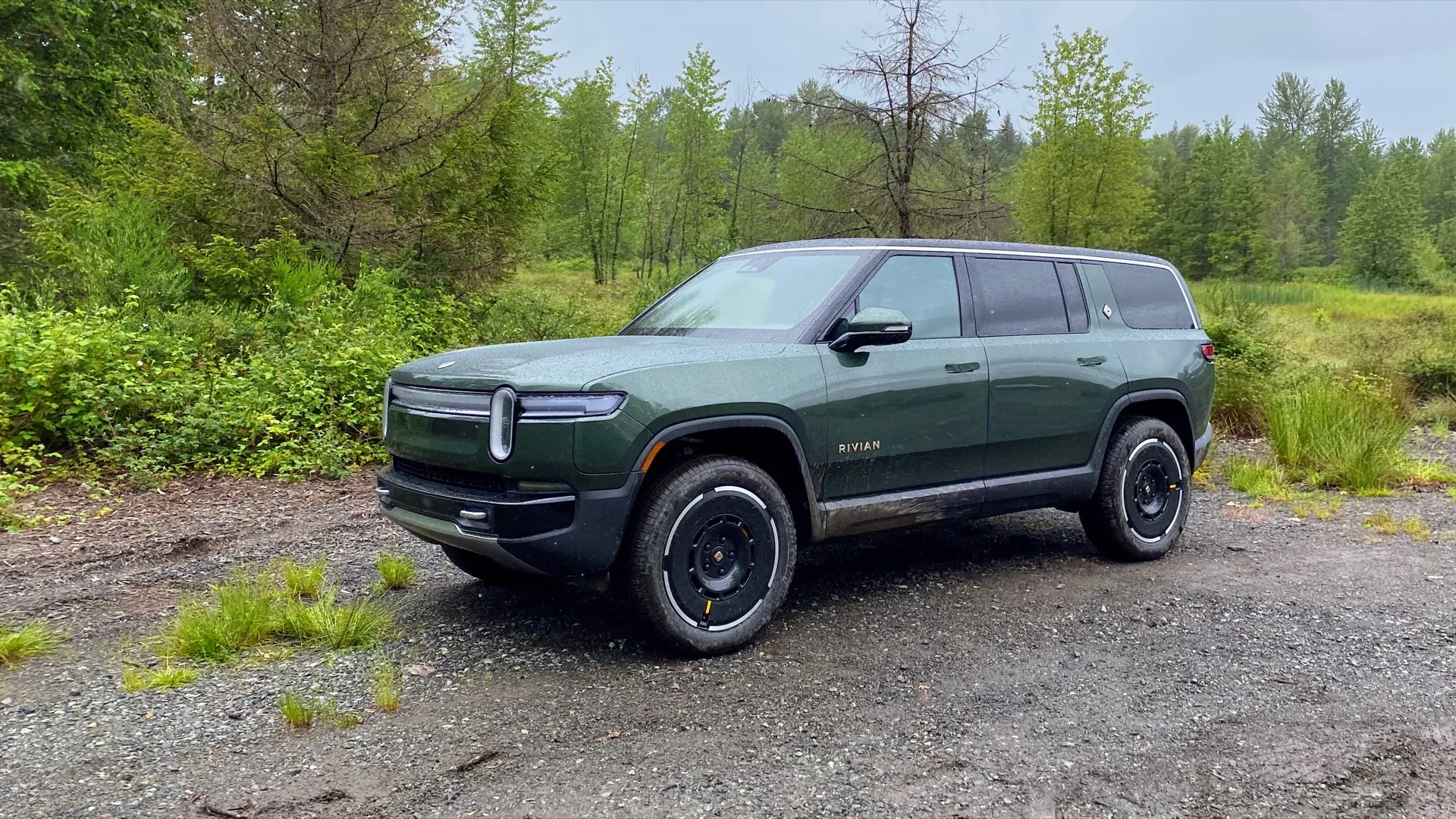Drifting a big three-row SUV around a muddy gravel handling course might not be something your typical Rivian R1S owner would ever do.
But simply that I can do this is a testament to the depth of engineering and tuning that goes into the 2025 Rivian R1 series, including the R1S electric SUV and R1T electric pickup. Both models have been given an extensive revamp that includes new motor layouts, battery packs, lighting, and interface details—effectively boosting these trucks’ capabilities while helping set the stage for the arrival of the brand’s mass-market R2 SUV family in a couple years.
Rather than left-foot-braking, as I might do in a rally-driving situation, I lift off the accelerator and the front wheels scrub speed momentarily, loading up the regen. Just as that happens I chuck the steering wheel sideways and stab my right foot down, sending the rear of the vehicle kicking outward. Keeping my right foot planted, the rear wheels churn away at the gravel and maintain a glorious drift, with just a bit of power delivered at the front wheels to keep it going.
Rivian R1S in the mud, at DirtFish
That’s essentially what Rally mode helps do—rotate the rear of the vehicle and slide, while maintaining control with the steering (and countersteering). I’m running in Rivian’s “reduced” stability control mode, which reels you in with a slight brake drag at one of the front wheels—but you can turn it off and be truly on your own in Spin City.
Selecting Drift instead, I note that Rivian’s hydraulic roll control, with its electronically controlled valving, softens appreciably, soaking up more of the harshness from the gravel and more easily allowing sustained slides but not helping as much to get around the corners.

2025 Rivian R1 lineup
Rivian R1T and R1S have “tunable” torque distribution
After heading out on that slippery course twice, at Washington State’s DirtFish rally school, I keep circling back to Rivian’s dynamic team in charge of tuning the R1 family and extracting this level of fun out of the vehicle, because I’m stunned that it’s this accessible, and that the vehicle feels this stable all the while.
“In Rally, we’re talking about how we get the car pointed in the right direction earlier…so that we can optimize grip and get straighter sooner,” said Luke Lynch, Rivian’s director of vehicle dynamics. “Whereas Drift, you’re there to go sideways, and so we’re changing that through the corner as well.”
“The torque distribution is our tunable,” summed Lynch, and it varies between these trucks’ drive modes.
With stability control off, the system in the Tri-Motor R1S defaults to about 30/70, explains Lynch, and it varies between the different modes. Tri-Motor versions are a little more complicated to tune, because Quad-Motor versions get a motor for each wheel and you can very precisely control them. With the front you’re at the mercy of the differential, and you have to use the brakes more to correct course, which isn’t as smooth.

2025 Rivian R1 lineup
The Rally and Drift modes I’m obsessed with are exclusive to the Tri-Motor and Quad-Motor versions of these trucks, two of the variants that are completely new in the revamped 2025 Rivian R1 lineup.
The Quad-Motor, with dual 2-motor modules, one at the front and the other at the rear, delivers a combined 1,025 hp, with 1,198 lb-ft of torque in launch control mode, and it provides 0-60 mph acceleration in less than 2.5 seconds according to Rivian. Tri-Motor versions, with a single motor at front wheels and a 2-motor module at the rear wheels, make 850 hp and 1,103 lb-ft, for a 0-60 mph time of 2.9 seconds.
There aren’t many electric SUVs that have this kind of multi-motor performance or technology credentials to rival these Rivians directly, dynamically. One of them is the 2024 Audi SQ8 E-Tron, although the Audi doesn’t at all have the off-road prowess.
To round out Rivian’s fresh lineup, Dual-Motor models split into regular and performance versions, with the former making 533 hp and 610 lb-ft (4.5 seconds) and the latter making 665 hp and 829 lb-ft (3.4 seconds).
There’s very little to distinguish these models on the outside. Quad-Motor brake calipers get a new color, Laguna Blue, with a low-key “QUAD” badge in the middle of their rear badge, while Tri-Motor models get yellow calipers and a yellow badge strip in back.

2025 Rivian R1 lineup
R1S and R1T get new battery packs, not faster charging
These so-called Generation 2 versions of Rivian’s R1S and R1T go well beyond motor configurations. Battery packs now offer 92.5-kwh, 109.4-kwh, and 141.5-kwh usable capacities, for Standard, Large, and Max sizes, respectively, and despite less energy in Standard and Large packs it’s managed to arrive at similar projected EPA range ratings—starting at 270 miles for the Standard Pack version and up to 420 miles for the Max Pack R1T. That’s all enabled by a new generation of aero wheels (the 22-inchers for the best aero, now!), a heat pump system, and mass savings from the body, the battery pack, and more.
Despite these changes, the R1 trucks retain the low, flat cargo floor in R1S versions and the innovation of the Gear Tunnel in R1T versions. The frunk is a useful 9.9 cubic feet, and little, thoughtful touches like the flashlight integrated into the driver’s door underscore that those who designed these vehicles took them out on their own adventures.

2025 Rivian R1 lineup
Then I’m hopping into a base, Dual-Motor Standard Pack R1T, which is now powered by larger lithium iron phosphate (LFP) pouch cells. It’s the model that goes a projected 270 EPA miles and costs $71,700, including the $1,800 destination charge, and I take it on a different kind of challenge, one of Rivian’s off-road courses. It truly gives the suspension a workout, in the way that an especially washed-out forest service track might, on the way to a hiker’s trailhead.
It includes fording more than three and a half feet of water, set in the R1S’ highest ride height, allowing 14.7 inches of ground clearance. The brown water is lapping up against the R1T’s newly bejeweled face—with distinct active-matrix headlamps laid out vertically plus the horizontal lightbar’s new RGB capability, that initially will help visualize how much charge you have in the battery.
Later I’m hopping into Quad-Motor R1S and R1T versions at Pacific Raceways in nearby Kent, Washington, for a sample of what exactly they’re capable of. In their launch control modes. The launch feels breathtakingly quick, and Rivian notes that versus previous Quad-Motor versions, these can maintain near peak power to a higher speed than before.

2025 Rivian R1 lineup

2025 Rivian R1 lineup

2025 Rivian R1 lineup
2025 Rivian R1: Softer, more livable on the road
I got road time as well—with a Dual-Motor Max Pack R1S and Tri-Motor Max Pack R1S, where I found these big EVs and their newly softer suspension tune, overall, to be livable and quiet. The R1S tracks well on backroads and fast-moving freeways alike. Potential owners will want to know, though, that these models still charge at a 220-kw maximum (or 200 kw for the LFP version), meaning a 10-80% charge will take 30-41 minutes, according to Rivian.
Rivian has updated the sensing system and electronic architecture, flattened and brightened the user interface, and added support for Apple Music and its Spatial Audio requiring a $14.99 connectivity service. You can also use an Apple Wallet or Apple Watch to unlock the Rivian or share keys with family or friends, but no version of the R1 lineup allows the sharing of your phone’s connection via Apple CarPlay.

2025 Rivian R1 lineup
The second-gen R1 family arrives for first deliveries this Friday, June 7. Quad-Motor Max Pack models haven’t yet been priced and will be coming a bit later. As Rivian aims toward its mass-market R2, these new R1S and R1T versions stand as harbingers of all the fun yet to come.
Rivian provided Seattle accommodations and some healthy meals to help facilitate this review.

